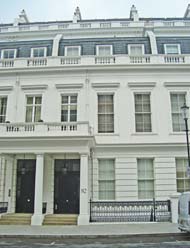California
House
82 Lancaster Gate, Bayswater, W2 3NH
Medical
dates:
Medical
character:
Rehabilitation (military)
By the end of 1915 the wounded
Belgian soldiers crowded into the Belgian
Refugee Clearing Station at
the former skating rink at Aldwych clamoured
for 'something to do'. Miss Julie
Helen Heyneman, (1871-1943) an American artist and writer from
California, took pity on them and, together with a committee of fellow
Californians living in London, arranged to provide premises and some
occupation for them which would benefit them in the future.
California House opened in February 1916. At first, because the servicemen were unable to make themselves understood (most spoke Flemish) and felt at a loss in London, they were taught English. Other languages followed - French, Italian, Russian and Spanish - as a natural development. Some Belgians later even found work at the Censor's office or as interpreters.
Soon paralysed men and amputees who had lost one or both legs appealed to be allowed to attend the Club, and an omnibus was hired to collect these disabled patients from their various hospitals. The Club's committee decided that those who were unlikely to be able to use their legs again should be persuaded to cultivate manual dexterity. Thus, classes in applied design were established. These involved the simplest forms of book-binding, wood-carving, chip-carving, fretsaw work, designing, drawing, painting and modelling.
In order to make handicrafts more interesting and provide an incentive to become more skilful, patients were encouraged to produce articles for sale. In this way, they acquired greater technical skill and produced better quality items. Despite materials becoming increasingly expensive and difficult to procure as the war progressed, each man was paid, according to his skill, at a rate varying from 10 to 50 per cent of the price of the article.
Classes were also held in theoretical mechanics, including mathematics and chemistry. Commercial classes were held in both English and French.
The Club was a success and, by the end of 1916, Miss Heyneman helped to establish a similar venture for British convalescent soldiers, which was named Kitchener House.
California House presumably closed at the end of the war in 1918.
More than 500 wounded Belgian soldiers had attended the Club, which provided classes free of charge. Practically all became self-supporting after the war. Some of the worst disabled men, on returning to Belgium, managed to find alternative work. One, previously a wheelwright in a small village, had lost both legs, but found regular employment as a wood-carver, while another, paralysed from the waist down, earned good wages at gesso and composition work.
Present status (January 2013)
California House opened in February 1916. At first, because the servicemen were unable to make themselves understood (most spoke Flemish) and felt at a loss in London, they were taught English. Other languages followed - French, Italian, Russian and Spanish - as a natural development. Some Belgians later even found work at the Censor's office or as interpreters.
Soon paralysed men and amputees who had lost one or both legs appealed to be allowed to attend the Club, and an omnibus was hired to collect these disabled patients from their various hospitals. The Club's committee decided that those who were unlikely to be able to use their legs again should be persuaded to cultivate manual dexterity. Thus, classes in applied design were established. These involved the simplest forms of book-binding, wood-carving, chip-carving, fretsaw work, designing, drawing, painting and modelling.
In order to make handicrafts more interesting and provide an incentive to become more skilful, patients were encouraged to produce articles for sale. In this way, they acquired greater technical skill and produced better quality items. Despite materials becoming increasingly expensive and difficult to procure as the war progressed, each man was paid, according to his skill, at a rate varying from 10 to 50 per cent of the price of the article.
Classes were also held in theoretical mechanics, including mathematics and chemistry. Commercial classes were held in both English and French.
The Club was a success and, by the end of 1916, Miss Heyneman helped to establish a similar venture for British convalescent soldiers, which was named Kitchener House.
California House presumably closed at the end of the war in 1918.
More than 500 wounded Belgian soldiers had attended the Club, which provided classes free of charge. Practically all became self-supporting after the war. Some of the worst disabled men, on returning to Belgium, managed to find alternative work. One, previously a wheelwright in a small village, had lost both legs, but found regular employment as a wood-carver, while another, paralysed from the waist down, earned good wages at gesso and composition work.
Present status (January 2013)
The building is now a private residence.

No. 82 Lancaster Gate.
Heyneman JH 1918 Educational clubs for wounded sailors and soldiers. Reveille 2, 314-318.
Hutt CW 1917 The Future of the Disabled Soldier. London, Bale, Sons & Danielsson.
http://socialarchive.iath.virginia.edu
www.oac.cdlib.org
Return to home page